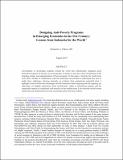Designing Anti-Poverty Programs in Emerging Economies in the 21st Century: Lessons from Indonesia for the World
Author(s)
Olken, Benjamin
DownloadAccepted version (344.1Kb)
Open Access Policy
Open Access Policy
Creative Commons Attribution-Noncommercial-Share Alike
Terms of use
Metadata
Show full item recordAbstract
Governments of developing countries around the world have dramatically expanded social protection programs for the poor in recent decades. In doing so, they face a host of challenges in the targeting, design and implementation of these programs. In this paper, I describe the results from more than a decade of collaboration with the Indonesian government to understand how best to tackle these challenges, drawing primarily on evidence from randomised controlled trials. I highlight results that show the advantages of both community-based targeting and self-targeting, the importance of tangible information about beneficiaries’ rights in minimising leakage, and the remarkable impacts of conditional cash transfers in the medium term. I also describe several recent studies that use randomisation at scale to generate policy-relevant evidence.
Date issued
2019-11Department
Massachusetts Institute of Technology. Department of Economics; Sloan School of ManagementJournal
Bulletin of Indonesian Economic Studies
Publisher
Informa UK Limited
Citation
Olken, Benjamin A. "Designing Anti-Poverty Programs in Emerging Economies in the 21st Century: Lessons from Indonesia for the World." Bulletin of Indonesian Economic Studies 55, 3 (November 2019): 319-339 © 2019 ANU Indonesia Project
Version: Author's final manuscript
ISSN
0007-4918
1472-7234